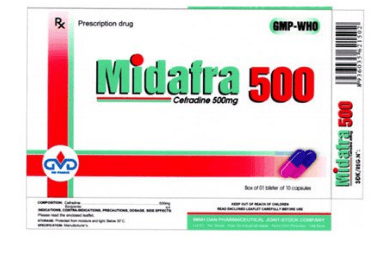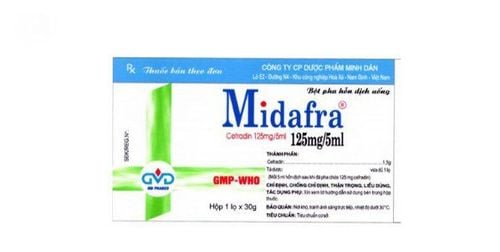This is an automatically translated article.
Ammoclone is prepared in the form of film-coated tablets with the main ingredients Amoxicillin trihydrate equivalent to Amoxicillin 500mg and Potassium clavulanate equivalent to clavulanic acid 125mg. So what is Ammoclone and how is it used?
1. What does Ammoclone do?
Amoxicillin is a semi-synthetic beta-lactam antibiotic with a broad spectrum of activity against many strains of gram-positive and gram-negative bacteria by inhibiting bacterial cell wall synthesis. But Amoxicillin is very susceptible to destruction by beta-lactamases, so it is not effective against many bacteria that produce these enzymes.
Clavulanic acid has the ability to inhibit beta-lactamase produced by most gram-negative bacteria and Staphylococcus. In particular, this active substance has strong inhibitory effect on plasmid-transmitted beta-lactamases causing resistance to penicillins and cephalosporins.
Therefore, clavulanic acid helps prevent Amoxicillin from being destroyed by beta lactamases, and at the same time helps to effectively expand the antibacterial spectrum of the drug against many bacteria normally resistant to Amoxicillin, other penicillins and other bacteria. Cephalosporin drugs. Clavulanic acid itself has a bactericidal effect, but this effect is very weak. The antibacterial spectrum of Ammoclone includes: Streptococcus pneumoniae, Streptococcus faecalis, Streptococcus viridans, Streptococcus pyogenes, Staphylococcus aureus, Corynebacterium, Bacillus anthracis, Listeria monocytogenes, Clostridium species, Peptostreptococcus, Peptococcus, Haemophilus influenzae, Proteus mirabilis, Escherichia coli, Escherichia coli, and Escherichia coli. vulgaris, Klebsiella species, Salmonella, Shigella, Vibrio cholerae, Bordetella, Neisseria gonorrhoeae, Neisseria meningitidis, Pasteurella multocida, Bacteroides including B.fragilis.
2. Indications and contraindications of the drug Ammoclone
Ammoclone is indicated in cases of infections caused by susceptible strains of bacteria, including:
Upper respiratory tract infections such as: tonsillitis, sinusitis, otitis media. Lower respiratory tract infections such as: acute and chronic bronchitis, spotty pneumonia and lobar pneumonia. Genitourinary tract infections such as: nephritis - pyelonephritis, bladder, urethritis. Obstetric infections. Infections of the skin and subcutaneous tissues such as boils, abscesses, cellulitis, wound infections. Bone and joint infections such as: Osteomyelitis. Intra-abdominal infection. Ammoclone is contraindicated in the following cases:
People with a history of allergy to penicillins or any of its ingredients. People with a history of cholestatic jaundice, liver failure caused by taking Amoxicillin - potassium clavulanate. Some notes when using Ammoclon e:
Should take into account the possibility of fungal or bacterial re-infection. If reinfection occurs (usually due to Pseudomonas or Candida), Ammoclone should be discontinued and/or appropriate treatment instituted. Although Amoxicillin-potassium clavulanate is only mildly toxic among penicillin-class antibiotics, it is recommended that you regularly check organ system function including liver, kidney and hematopoietic system during treatment with Ammoclone. Many patients with mononucleosis when taking ampicillin will increase the rash. Therefore, ampicillin-class antibiotics should not be used as Ammoclone in patients with mononucleosis. Ammoclone medicine contains potassium, not good for patients who need to eat less potassium, patients with hyperkalemia. Ammoclone should be used with caution in pregnant and lactating women.
3. Dosage and how to use Ammoclone
The drug Ammoclone is used orally. The dosage of Ammoclone should be according to the doctor's prescription, the reference dose for specific cases is as follows:
Adults and children over 12 years old: Use a dose of 1 tablet every 8 hours, the course of treatment is prolonged. from 7 to 10 days. Children under 12 years of age: A tablet with a lower content of active ingredients or a more appropriate dosage form should be used. Do not use Ammoclone for more than 14 days without re-examination. Most patients did not show symptoms of Ammoclone overdose or present mainly with gastrointestinal symptoms such as stomach pain, abdominal pain, vomiting and diarrhea. Symptoms of rash. Hypersensitivity or somnolence has also been observed in a small number of patients.
In case of an overdose of Ammoclone, you need to stop taking the drug, treat the symptoms and take appropriate measures. If an overdose of Ammoclone has occurred only recently and there are no contraindications, the doctor may induce vomiting or use measures to eliminate the drug from the stomach.
4. Side effects of the drug Ammoclone
Adverse effects of Ammoclone are usually transient and mostly mild and usually resolve on their own. The side effects of Ammoclone you may experience include:
Diarrhea. Pseudomembranous colitis. Indigestion. Nausea and vomiting. Candidiasis . Nausea is more common with high doses of the drug. Urticaria and erythema are very rare. Urticaria is suggestive of a penicillin allergy and treatment should be discontinued. Erythema is usually short-lived but can be a sign of exacerbation when it is associated with infectious mononucleosis. erythema multiforme. Stevens-Johnson syndrome. Severe edema. Angioedema. Leukopenia. Decreased platelets. Hepatitis . Jaundice. Side effects of the drug may appear more in patients with a history of allergy to penicillin or people with a predisposition to allergies. Gastrointestinal side effects of Ammoclone can be reduced by taking the drug just before meals.
If you experience any side effects of Ammoclone, please notify your doctor immediately or go to the nearest medical facility for timely support from medical staff.
4. Interaction of Ammoclone with other drugs
Probenecid reduces the excretion of Amoxicillin through the renal tubules, so when using Prebenecid with Ammoclone simultaneously can increase the concentration of Amoxicillin and prolong the life of the drug in the blood. Ammoclone may decrease the effectiveness of oral contraceptives. The possibility of prolongation of the clotting time should be taken into account in patients receiving concomitant Ammoclone with anticoagulants. To be on the safe side, you should tell your doctor about all your medications before you start taking Ammoclone.
Above is information about uses, doses and precautions when using Ammoclone. To ensure safety for your health and maximize the effectiveness of your treatment, you need to take Ammoclone exactly as directed by your doctor.
Please dial HOTLINE for more information or register for an appointment HERE. Download MyVinmec app to make appointments faster and to manage your bookings easily.













